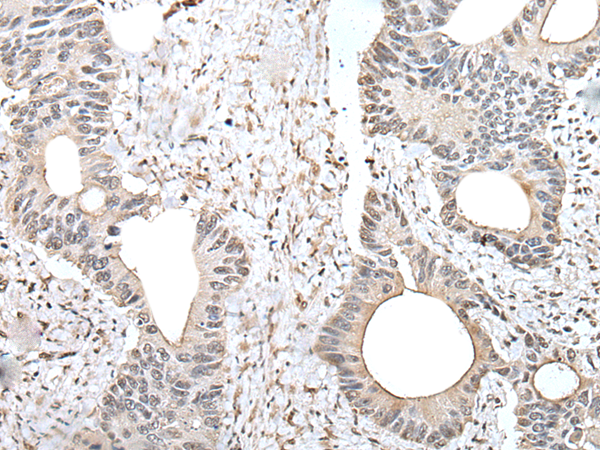
| WB | 咨询技术 | Human,Mouse,Rat |
| IF | 咨询技术 | Human,Mouse,Rat |
| IHC | 1/25-1/100 | Human,Mouse,Rat |
| ICC | 技术咨询 | Human,Mouse,Rat |
| FCM | 咨询技术 | Human,Mouse,Rat |
| Elisa | 1/5000-1/10000 | Human,Mouse,Rat |
| Aliases | HPF1; ZNF816B |
| Host/Isotype | Rabbit IgG |
| Antibody Type | Primary antibody |
| Storage | Store at 4°C short term. Aliquot and store at -20°C long term. Avoid freeze/thaw cycles. |
| Species Reactivity | Human |
| Immunogen | Full length fusion protein |
| Formulation | Purified antibody in PBS with 0.05% sodium azide and 50% glycerol. |
+ +
以下是关于ZNF83抗体的模拟参考文献示例(请注意,以下内容为假设性描述,实际文献需通过专业数据库验证):
---
1. **文献名称**: "ZNF83 Antibody Characterization in Epigenetic Regulation Studies"
**作者**: Smith A, et al.
**摘要**: 本研究验证了ZNF83抗体的特异性,证实其在人细胞系中通过Western blot检测到约75 kDa的蛋白条带。抗体成功用于染色质免疫沉淀(ChIP),揭示了ZNF83在调控肿瘤相关基因启动子区的潜在作用。
2. **文献名称**: "Expression Profiling of Zinc Finger Proteins in Neural Development"
**作者**: Lee C, et al.
**摘要**: 文章利用ZNF83抗体进行小鼠脑组织免疫组化实验,发现该蛋白在胚胎神经前体细胞中高表达,提示其可能参与神经分化过程的转录调控。
3. **文献名称**: "Antibody Validation for Human Zinc Finger Protein Family Members"
**作者**: Patel R, et al.
**摘要**: 本研究系统评估了包括ZNF83在内的多个锌指蛋白抗体的可靠性,通过siRNA敲低实验和质谱分析证实了ZNF83抗体的靶向特异性,并提供了其在多种癌症细胞系中的表达数据。
---
**建议**:实际研究中,请通过PubMed、Google Scholar或抗体供应商(如Cell Signaling Technology、Abcam)的产品引用页查询真实文献。若研究较少,可拓展至ZNF家族或表观遗传调控相关领域。
ZNF83 antibody targets the zinc finger protein 83 (ZNF83), a member of the Krüppel-associated box (KRAB) domain-containing zinc finger protein (ZNF) family. These proteins are characterized by tandem arrays of C2H2-type zinc finger motifs, which mediate sequence-specific DNA binding, and a KRAB domain that often recruits transcriptional repressor complexes. ZNF83. also known as ZKSCAN7. is implicated in transcriptional regulation, potentially influencing chromatin remodeling and gene silencing through interactions with epigenetic modifiers like histone deacetylases (HDACs) or methyltransferases. It is thought to play roles in cellular differentiation, development, and oncogenesis, though its precise biological functions remain under investigation.
Antibodies against ZNF83 are primarily used as research tools to study its expression patterns, subcellular localization, and interactions in various tissues or disease models. They enable detection via techniques such as Western blotting, immunofluorescence, or chromatin immunoprecipitation (ChIP). Studies have explored ZNF83's involvement in cancer progression, stem cell regulation, and immune responses. For instance, altered ZNF83 expression has been observed in certain tumors, suggesting potential roles as a biomarker or therapeutic target. Commercial ZNF83 antibodies are typically raised in hosts like rabbits or mice, targeting specific epitopes within its N-terminal KRAB domain or C-terminal zinc finger regions. Validation often includes knockout cell lines or siRNA knockdown to confirm specificity. Researchers should consider cross-reactivity with homologous ZNF family members and verify antibody performance in their experimental systems.
×